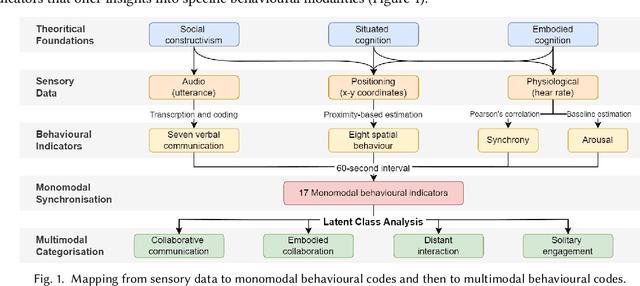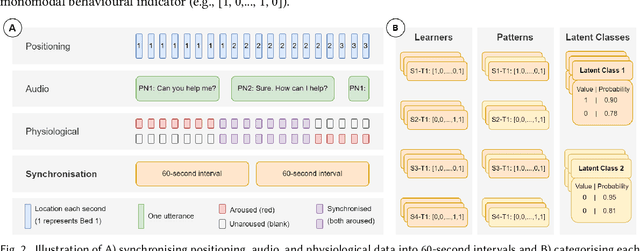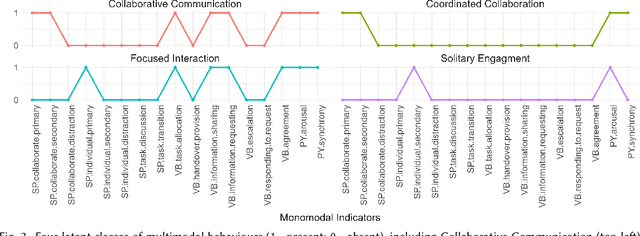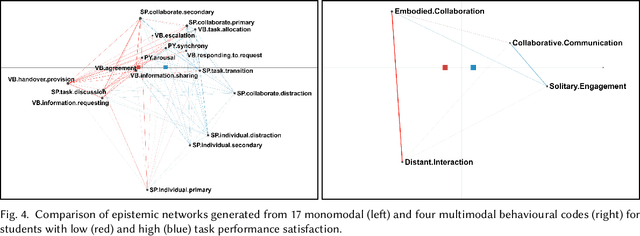Linxuan Zhao
From Complexity to Parsimony: Integrating Latent Class Analysis to Uncover Multimodal Learning Patterns in Collaborative Learning
Nov 23, 2024



Abstract:Multimodal Learning Analytics (MMLA) leverages advanced sensing technologies and artificial intelligence to capture complex learning processes, but integrating diverse data sources into cohesive insights remains challenging. This study introduces a novel methodology for integrating latent class analysis (LCA) within MMLA to map monomodal behavioural indicators into parsimonious multimodal ones. Using a high-fidelity healthcare simulation context, we collected positional, audio, and physiological data, deriving 17 monomodal indicators. LCA identified four distinct latent classes: Collaborative Communication, Embodied Collaboration, Distant Interaction, and Solitary Engagement, each capturing unique monomodal patterns. Epistemic network analysis compared these multimodal indicators with the original monomodal indicators and found that the multimodal approach was more parsimonious while offering higher explanatory power regarding students' task and collaboration performances. The findings highlight the potential of LCA in simplifying the analysis of complex multimodal data while capturing nuanced, cross-modality behaviours, offering actionable insights for educators and enhancing the design of collaborative learning interventions. This study proposes a pathway for advancing MMLA, making it more parsimonious and manageable, and aligning with the principles of learner-centred education.
Human-AI Collaboration in Thematic Analysis using ChatGPT: A User Study and Design Recommendations
Nov 07, 2023Abstract:Generative artificial intelligence (GenAI) offers promising potential for advancing human-AI collaboration in qualitative research. However, existing works focused on conventional machine-learning and pattern-based AI systems, and little is known about how researchers interact with GenAI in qualitative research. This work delves into researchers' perceptions of their collaboration with GenAI, specifically ChatGPT. Through a user study involving ten qualitative researchers, we found ChatGPT to be a valuable collaborator for thematic analysis, enhancing coding efficiency, aiding initial data exploration, offering granular quantitative insights, and assisting comprehension for non-native speakers and non-experts. Yet, concerns about its trustworthiness and accuracy, reliability and consistency, limited contextual understanding, and broader acceptance within the research community persist. We contribute five actionable design recommendations to foster effective human-AI collaboration. These include incorporating transparent explanatory mechanisms, enhancing interface and integration capabilities, prioritising contextual understanding and customisation, embedding human-AI feedback loops and iterative functionality, and strengthening trust through validation mechanisms.
Practical and Ethical Challenges of Large Language Models in Education: A Systematic Literature Review
Mar 17, 2023
Abstract:Educational technology innovations that have been developed based on large language models (LLMs) have shown the potential to automate the laborious process of generating and analysing textual content. While various innovations have been developed to automate a range of educational tasks (e.g., question generation, feedback provision, and essay grading), there are concerns regarding the practicality and ethicality of these innovations. Such concerns may hinder future research and the adoption of LLMs-based innovations in authentic educational contexts. To address this, we conducted a systematic literature review of 118 peer-reviewed papers published since 2017 to pinpoint the current state of research on using LLMs to automate and support educational tasks. The practical and ethical challenges of LLMs-based innovations were also identified by assessing their technological readiness, model performance, replicability, system transparency, privacy, equality, and beneficence. The findings were summarised into three recommendations for future studies, including updating existing innovations with state-of-the-art models (e.g., GPT-3), embracing the initiative of open-sourcing models/systems, and adopting a human-centred approach throughout the developmental process. These recommendations could support future research to develop practical and ethical innovations for supporting diverse educational tasks and benefiting students, teachers, and institutions.
 Add to Chrome
Add to Chrome Add to Firefox
Add to Firefox Add to Edge
Add to Edge